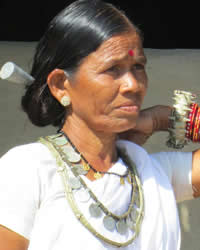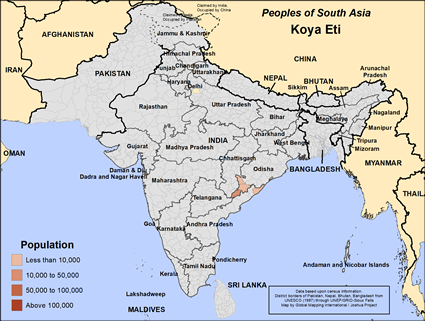The Koya language, also called Koyi, is closely related to Gondi and has been strongly influenced by Telugu, the tongue of the neighboring Hindu population. The Koya are one of the few multi-racial and multi-lingual tribal communities in India. Most Koya speak either Gondi or Telugu, in addition to Koyi.
Since India's independence from the British in 1947, the Indian government has increased its influence over the Koya peoples. As a result, the Koya have rebelled numerous times. The Koya resent the restrictions that have been placed on their use of reserve forests and distillation of liquor. They also resent the hydroelectric projects and rehabilitation of refugees in their land.
The Eti Koya live only in Odisha, India.
The Eti Koya are primarily farmers. They once shifted from one plot to another, farming various areas. However, the government has now restricted their movement and has encouraged them to farm on fixed plots. They showed the Koya how to farm coconut and coffee. They also granted the Koya permanent ownership rights to their land if they would grow rice there. In the hill regions occupied by the Koya, there are still no permanent farms. They grow crops in small clearings for only two or three years. Rice and tobacco are the main cash crops for those in the hill regions.
Their staple food is sorghum, but they have a strong affinity for palm juice. The Eti Koyas consider the palm tree as a gift of nature, and every family owns at least four to eight of them. During the four-month palm season, Koya families live almost entirely on palm juice.
Because their income from farming is very low, many of the Eti Koya who do not own land work as hired farm laborers. Others weave bamboo baskets and sell them at the weekly markets to Hindu merchants. They also are excellent hunters. Good hunters are regarded as heroes. Hunting is valuable to provide food and protection from wild animals. Many still use bow and arrows for hunting and to attack their enemies. Koya gather forest produce to supplement the vegetables grown in their home gardens. Cattle are symbols of wealth, and they are kept for their dairy products, meat, fertilizer, and trade. They are also used in religious sacrifices.
The Eti Koya usually live in villages. Occasionally, they can be found living with other tribal and non-tribal peoples. Eti Koya villages are located near dependable water sources. The larger villages are situated near the rivers while the smaller ones can be found in the hills and jungles. Their wood, thatch, and mud houses are built without windows. They usually have two rooms and a porch around the outside.
All Koya belong to one of five sub-divisions called gotrams. Every Eti Koya is born into a clan, and he cannot leave it. Birth, marriage and death are three important celebrations in Koya villages. The family group is called the kutum. Sons usually live separately from the family, but still work the farm with their parents and brothers. They practice monogamy. Most marriages among adolescents are arranged by the parents with the consent of the girl. Marriage ceremonies last for three days in the summer when palm juice is plentiful. They involve both the bride and groom's villages.
According to Eti Koya mythology, life originated from water. The Eti Koya practice their own ethnic religion, but also worship a number of Hindu gods and goddesses. Many Koya deities are female, the most important being the "mother earth." Village priests carry out their sacrifices. They believe their main deity still resides in a cave in the Bastar region.
The Eti Koya do not believe in heaven, hell, or reincarnation. When a person dies, his body is carried on a cot which is covered with grain, liquor, new clothes, money, and a cow's tail. At the appropriate place, the cot is faced towards the West, and the body is burned. They place the ashes in a clay pot. The Eti Koya believe that their spirits either linger about the clay ancestor pot, patrol the sky over the village or wander about the village disturbing daily life.
Cholera, smallpox, and malaria are big problems for the Eti Koya. They need quality medical care as well as health and hygiene education.
Pray for Eti Koya families of believers loving and serving others to grow reproducing churches.
Pray for a chain reaction of Eti Koya families reaching families that results in thousands of new believers who share their faith with others.
Pray for grace and truth expanding into the entire Eti Koya society as all believers learn to love others.
Pray that churches and believers will bless their entire people group in such a way that God's love will change the Eti Koya people like yeast changes dough.
Scripture Prayers for the Koya Eti in India.
https://joshuaproject.net/people_groups/17282/IN
https://www.indiantribalheritage.org/?tag=koya
https://www.thebetterindia.com/130765/koya-tribe-odisha-female-journalist/
https://en.wikipedia.org/wiki/Koya_(tribe)
http://www.peoplesoftheworld.org/hosted/koya/
https://www.encyclopedia.com/places/asia/japanese-physical-geography/koya
| Profile Source: Keith Carey |











